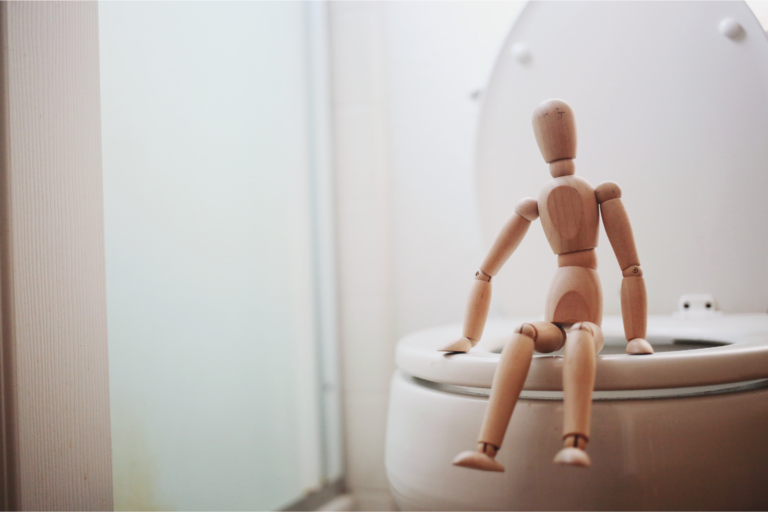Here’s Why You Have White Specks in Your Stool
Key Takeaways:
Several health problems, including parasitic infections, Candida, liver disease, and malabsorption issues, can cause white specks in poop.
Undigested food, supplements, or medications can also appear as white dots in your stool.
By addressing the underlying cause, whether by antiparasitic medications, dietary changes, or regulation of the gut microbiome, the white specks in your poop will generally resolve.
Common causes of white specks in stool
Causes of white specks in poop range from medical conditions to undigested food or supplements.
Because the cause may be very minor to severe, your doctor may perform a number of tests to diagnose the underlying issue, such as:
- Blood tests
- Stool tests (a stool sample will be collected and tested for anomalies)
- Endoscopy (a flexible tube with a camera on the end is used to examine parts of your gastrointestinal tract)
Tapeworms
One of the most common causes of white specks in feces is a tapeworm infestation, also known as Cestodes.
These parasites are common in areas with poor sanitation, especially near livestock and in places with contaminated water sources. Consuming raw or undercooked meat, particularly pork, can also lead to tapeworm infestations.
Once ingested, tapeworms embed themselves into the intestinal wall or muscles in a process called cysticercosis. In more severe cases, they can even enter brain tissue, resulting in a condition known as neurocysticercosis.
The parasites feed on the host’s nutrients, leading to symptoms such as unexplained weight loss, abdominal discomfort, and fatigue.
With good hygiene practices and careful food preparation, tapeworm infections can generally be prevented. If you do get a tapeworm, it’s almost always possible to get rid of it with medication.
Pinworms
Another common parasite that leads to the appearance of white specks in poop is pinworms. Pinworms, or threadworms, are small roundworms that are the most common type of worm infection in the United States.
Like tapeworms and hookworms, they can cause white specks in stool, as the female pinworm lays microscopic eggs around the anus, which can end up in the feces.
Children are particularly susceptible to pinworm infestations due to their play habits and the ease with which the eggs can be spread through touch.
The pinworms live in the rectum and colon area and can lead to symptoms like anal itching, restlessness, and in some cases, digestive disturbances.
To prevent pinworm infections, maintain good personal hygiene, like regular handwashing, especially after using the bathroom and before meals. Also, keeping your living environment clean can help in curbing the spread of pinworms.
Medical treatments are also available to effectively treat pinworm infestations.
Hookworms
Hookworms (Necator americanus), while not as common as pinworms or tapeworms in developed countries, can also cause white specks or tapeworm segments in stool.
They’re typically found in contaminated soil and fecal matter, which are the primary sources of infection. For instance, the larvae of hookworms, which can penetrate human skin, can infect your body if you walk barefoot on contaminated soil.
These parasites attach themselves to the walls of the small intestine, where they feed on the host’s blood, leading to nutrient loss and possible anemia.
Other symptoms of a hookworm infection might include abdominal pain, diarrhea, weight loss, anemia, and fatigue. In severe cases, hookworm infestations may cause developmental impairments in children and pose serious risks to pregnant women.
It’s important to keep in mind that good hygiene practices and wearing protective footwear when walking in potentially contaminated areas can help prevent hookworm infections.
Read Next: Sweet-Smelling Poop: Causes In Adults & Babies
Undigested food, supplements, or medications
Sometimes, white specks in your stool can be due to undigested food particles. Foods that are high in fiber, like certain grains, may not be entirely broken down during the digestive process and can appear as white specks in your stool.
Certain supplements and pharmaceutical drugs may also contribute to the appearance of these white specks, including:
- Oxycontin (for pain)
- Extended-release (ER) metformin (for diabetes)
- Venlafaxine (for depression)
Empty capsules are sometimes called “ghost pills” when seen in poop.
Candida overgrowth
An overgrowth of the Candida yeast, known as candidiasis, can also cause white specks in stool.
Candida is a genus of yeast that naturally resides in our bodies, particularly in the digestive tract and on our skin, without generally causing any harm.
Candida overgrowth often happens when the body’s natural balance of microorganisms (the microbiome) is disrupted. This often happens due to factors like a weakened immune system, high-sugar diets, stress, or the use of antibiotics.
When Candida grows out of control, it can cause an infection in the gut lining. The white specks observed in the poop could be clumps of yeast or cells shed from the lining of the intestines.
Aside from white specks in your stool, you may also experience other symptoms with Candida overgrowth, such as bloating, constipation, or diarrhea. Some individuals may also experience symptoms that extend beyond the gastrointestinal tract, like fatigue, joint pain, and a weakened immune system.
Management of Candida overgrowth typically involves restoring the balance of the gut microbiota.
Gallstones and liver disease
Gallstones, formed by hardened deposits within the fluid in your gallbladder, and liver diseases can both result in white stools.
When there’s a blockage in the bile ducts, the stool can turn white or clay-colored, sometimes perceived as yellow stool. If liver disease is the culprit of white specks in your poop, you’ll probably have other symptoms like abdominal pain and weight loss.
Malabsorption and digestive conditions
Certain medical conditions that interfere with the digestive process may cause malabsorption. This can often lead to white spots in the stool, indicating undigested food or unabsorbed fats.
Common malabsorption conditions are:
- Celiac disease
- Irritable bowel syndrome (IBS)
- Irritable bowel disease (IBD), including Crohn’s disease and ulcerative colitis
These conditions sometimes cause yellowish or greenish stool.
Treatments
Treatments for white specks in stool are based on the root cause of the problem and look very different based on this root cause.
It’s worth noting that some treatments could potentially exacerbate other conditions. For instance, dietary changes might help manage IBS symptoms but may also potentially aggravate symptoms if you also have a parasitic infection.
All treatments for white specks in stool should be pursued under the supervision of a healthcare provider. They’ll take into account your overall health and other medical conditions to ensure that the chosen treatment is safe and effective for you.
If your symptoms persist after treatment, follow up with your healthcare provider to reassess the situation.
Antiparasitic medications
Antiparasitic medications may be prescribed to fight the infestation in cases caused by tapeworms, pinworms, hookworms, or other parasites.
Praziquantel is a common medication that causes tapeworms to detach from your intestines and dissolve. Albendazole and mebendazole are commonly used for treating roundworm infections.
Note: When one person in a household is diagnosed with a parasitic infection, everyone in that same household should receive treatment to avoid reinfection.
Dietary adjustments
If the white specks in your stool result from certain dietary factors, like high-fiber foods or supplements, adjusting your diet might be the best course of action.
Eat more easily digestible foods and ensure your supplements don’t include substances that pass through your system unabsorbed.
Note: If you notice undigested food in your stool over more than a few days, call your doctor. You may need to investigate possible causes of why your digestive system isn’t processing what you consume.
If you struggle with celiac disease, you may experience improvement by eliminating gluten-containing foods from your diet. For patients with celiac, intestinal inflammation can increase gut motility, causing diarrhea and limiting how well food is digested.
If you notice you’re losing weight rapidly or experiencing other symptoms of parasitic infection, call your doctor before changing your diet dramatically. What helps with malabsorption may irritate a parasite.
Antifungal treatment
For Candida infection, healthcare professionals usually prescribe a combination of antifungal medications and dietary changes to reduce sugar and yeast intake. Probiotic supplements can also help restore the balance of bacteria in the digestive tract.
Gallstones and liver disease treatment
If gallstones or liver disease cause your white stools, treatment options may include medication to dissolve gallstones or procedures to remove them.
For liver disease, treatment will depend on the specific condition but could involve lifestyle changes, medication, or in very severe cases, a liver transplant.
Digestive condition treatment
For conditions like IBS, celiac disease, Crohn’s, or ulcerative colitis, treatment frequently includes:
- Dietary changes
- Medications to control inflammation and other symptoms, which may come with side effects
- Surgery (in some cases)
It’s crucial to manage these conditions under the supervision of a healthcare provider.
Long-term complications
Ignoring white specks in your stool and failing to seek medical attention when needed could lead to a variety of potential long-term complications, depending on the underlying cause.
If you don’t address parasitic infection…
Long-term untreated infestations with parasites like tapeworms or pinworms can lead to various complications.
Over time, the parasites can cause nutrient malabsorption, leading to weight loss, anemia, and chronic fatigue.
In severe cases of tapeworm infection, you may develop cysts in vital organs, including the liver and brain (neurocysticercosis), which can lead to seizures and other neurological issues.
If you don’t address gallstones and/or liver disease…
Untreated gallstones can cause a blockage in the bile duct, leading to intense abdominal pain, pancreatitis (inflammation of the pancreas), or cholangitis (inflammation of the bile ducts).
Long-standing liver disease, when left untreated, can lead to cirrhosis, liver failure, and an increased risk of liver cancer.
If you don’t address digestive disorders…
Digestive disorders like irritable bowel syndrome (IBS), celiac disease, Crohn’s, or ulcerative colitis can worsen over time if left untreated.
This can lead to chronic abdominal pain, significant changes in bowel habits, malabsorption, and malnutrition. In severe cases, complications may include intestinal obstruction, abscesses, or an increased risk of colon cancer.
If you don’t address Candida overgrowth…
Long-term untreated Candida overgrowth may weaken your immune system, resulting in more frequent infections. In severe cases, the fungus could enter the bloodstream causing systemic candidiasis, which is a severe condition that can affect the brain, heart, and other organs.
How to prevent white specks in poop
Preventing the appearance of white specks in your stool largely depends on what caused it in the first place. Here are some general strategies to help you avoid this issue:
- Practice good hygiene: Good hygiene is crucial in preventing most types of parasitic infections. Regular handwashing, especially before eating and after using the bathroom, can dramatically reduce the risk of many infections. Avoid touching your mouth with unwashed hands and keep your fingernails clean and trimmed short to prevent parasites from congregating.
- Cook safely: To avoid parasitic infections from contaminated food, cook all of your food, particularly meat, thoroughly. Tapeworms and Trichinosis worms can often be found in undercooked pork, and raw or undercooked fish can harbor parasites as well. Minimum cooking temperatures are set by meat to ensure any remaining bacteria or parasites are eliminated before eating.
- Consider your diet: Eating a balanced diet rich in fiber can help regulate your digestive system and reduce the risk of constipation. Similarly, if malabsorption is the cause, you might need to identify and eliminate food intolerances or allergies. For instance, individuals with celiac disease should avoid gluten to prevent digestive issues.
- Take probiotics: Probiotic supplements can aid in maintaining a healthy balance of gut bacteria, which promote healthy digestion. Probiotics might also help prevent Candida overgrowth, which can cause white spots in stool.
- Drink plenty of water: Staying well-hydrated can aid digestion and help prevent constipation. This, in turn, can minimize the appearance of undigested food or hardened mucus in your stool.
- Get regular medical check-ups: Regular medical check-ups can ensure early detection and treatment of any potential health problems. In cases of liver disease or gallstones, early detection can prevent complications and the appearance of white stools.
These measures aren’t foolproof, but they can significantly reduce the likelihood of white specks appearing in your poop. If you continue to notice these specks, make sure to seek medical advice promptly.
When to consult your doctor
If you’ve noticed white specks in your poop, it’s important not to jump to conclusions or self-diagnose. Many of the causes of these white spots are harmless and often related to dietary changes.
However, persistent or recurring appearances of white specks, especially when accompanied by other symptoms, should prompt you to seek medical attention.
Here are some situations when you should definitely consult your doctor:
- Unexplained weight loss: If you notice that you’re losing weight without any changes to your diet or physical activity, this could be a sign of malabsorption or a parasitic infection, such as tapeworms or hookworms. These parasites absorb your nutrients, which can lead to weight loss.
- Persistent abdominal pain: Abdominal pain can be a symptom of many different health problems. However, persistent pain alongside white specks in your stool could indicate a condition like gallstones, liver disease, or a gastrointestinal problem like ulcerative colitis or Crohn’s disease.
- Changes in bowel movements: Alterations in the frequency, consistency, or volume of your bowel movements alongside the appearance of white specks could signify a digestive tract issue. Constipation, diarrhea, bloating, or blood in the stool are all signs that you should consult a healthcare professional.
- Other unexplained symptoms: Experiencing symptoms such as fatigue, bloating, nausea, or vomiting, along with the appearance of white specks in your feces, could signal an underlying health problem that needs medical attention. For example, conditions like Celiac disease or Irritable Bowel Syndrome (IBS) can cause these symptoms.
- Persistence of white specks: If the white specks in your poop persist even after dietary changes or over-the-counter treatments, it’s time to consult a doctor. It’s possible that the white specks are due to a more serious condition like a parasitic infection or malabsorption syndrome that needs professional treatment.
If you’re ever in doubt about symptoms or changes in your health, it’s always best to seek medical advice. Regular check-ups and open communication with your doctor are vital to maintaining your overall health and well-being.







![Why Does My Poop Smell Sweet? [Infants & Adults]](https://poopquestions.com/wp-content/uploads/Sweet-Smelling-Poop-Header-768x513.png)